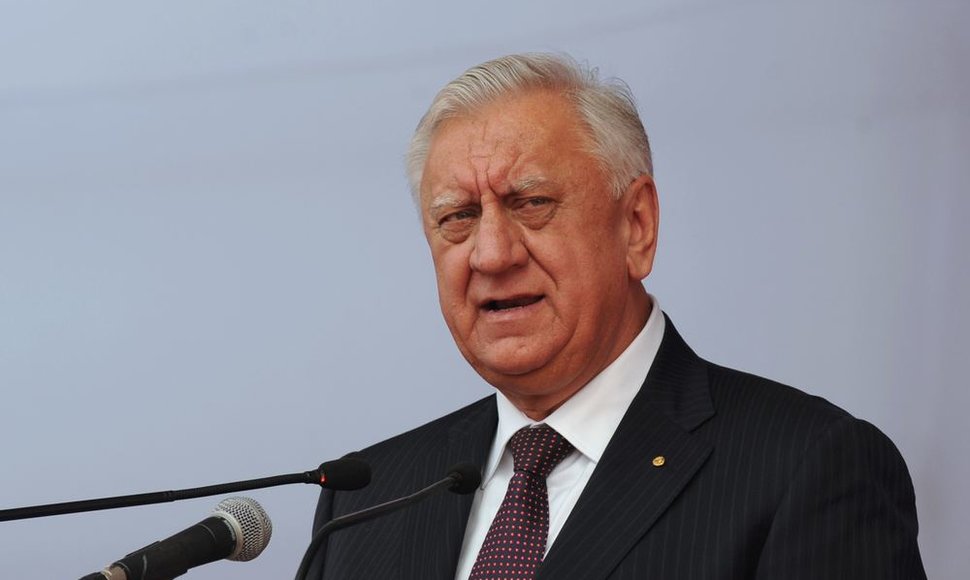According to Butkevičius, the Belarusian prime minister, currently visiting Klaipėda, could be also invited to the forthcoming EU Eastern Partnership summit in November in Vilnius.
"Belarusian-EU political relations are really tense. But during yesterday's conversation, I understood that they would definitely want to improve the relations and have closer cooperation with the EU," Butkevičius told BNS on Thursday.
"During the presidency, the issue of improving EU-Belarusian relations might even be brought forward, but, naturally, Belarus has to complete those tasks named by the EU," the Lithuanian prime minister said.
Contrary to the president and foreign affairs minister, the Belarusian prime minister is not on the EU's blacklist of persons who are banned from entering EU member states due to their involvement in repressions against the opposition.
Ruling Belarus since 1994, President Alexander Lukashenko cracked down on the opposition in response in protests after the 2010 presidential elections.
Butkevičius says Belarus "sees Lithuania as a certain bridge to the EU."
"Naturally, we, as an EU member state, have to respect EU demands and sanctions. Of course, some businessmen respond a bit negatively," the Lithuanian prime minister said.
Asked whether the Belarusian prime minister promised to make any steps to respond to the EU's demand to release political prisoners, Butkevičius said: "I believe that every country, which declares itself a democracy, should make those steps."
"And if some violent arrests are made or human rights and freedoms are violated, then such an example or such behavior only causes opposition from other countries. But we mainly talked about economic issues during this meeting," the Lithuanian prime minister said.
Relations with the EU's eastern neighbors will be one of the key issues on the Lithuanian EU Presidency's agenda in the second half of this year. The forthcoming EU Eastern Partnership in November in Vilnius will be dedicated for this issue. Butkevičius says his Belarusian counterpart might attend it.
"I think the prime minister, who has the right to enter EU member states, will be invited. But that's the EU's prerogative," Butkevičius said.
Some representatives of nongovernmental organizations have called on against inviting Belarusian representatives to the EU Eastern Partnership summit. During his visit to Lithuania in January, David Kramer, head of Freedom House, said it would be better if Belarus was represented not by representatives of President Alexander Lukashenko's regime but civil society activists and human rights defenders at the summit.
Nuclear determination
Prime Minister Myasnikovich has also told Butkevičius that Minsk is resolved to build a nuclear power plant in Astravyets.
However, Butkevičius later admitted that he had not been fully convinced of that.
“They stated that they were resolved and will definitely build a nuclear power plant in Astravyets,” Lithuania’s government leader told BNS on Thursday. Belarus had notified that it had worked out the answers pertaining to the environmental impact assessment (EIA) and urged the ministers of environment of both countries to discuss them, he added.
However, Butkevičius admitted that he had not been fully convinced by Myasnikovich. “In fact, I could not confirm that he has convinced me fully. I asked about loan costs and so on, and here we had a short pause.”
Cargo transit
The government of Belarus does not intend to divert the transit of its cargo from Klaipėda to Russia’s ports, according to Butkevičius.
He says that he got the assurances during his meeting with the Prime Minister of Belarus.
“I have understood from yesterday’s conversation that they do not have such plans and they are ready to intensify cooperation with Lithuania and to ship cargo through the seaport of Klaipėda,” Butkevičius told BNS.
The President of Belarus Alexander Lukashenko stated on several occasions last year and this year that Minsk might reduce the flow of Belarusian cargo going through the port of Klaipėda and divert it to Russia’s ports.
However, Butkevičius said on Thursday that he believed that “those threats will definitely not be realized”, and the bilateral economic forum hosted by Lithuania this week let dispel the doubts.












